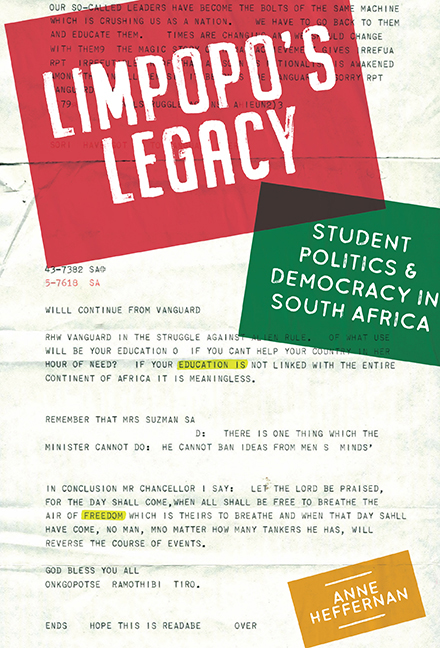Book contents
- Frontmatter
- Dedication
- Contents
- Acknowledgements
- Abbreviations and Acronyms
- Map of the north-eastern Bantustans showing the location of Limpopo
- Introduction
- 1 Turfloop, Crucible of Change
- 2 Centre of the Storm
- 3 Africanization: The New Face of Turfloop
- 4 Black Consciousness in Decline
- 5 Congresses and Comrades
- 6 Populism and the New Youth League
- 7 Julius Malema and Youth Politics in the New Limpopo
- Epilogue: Legacies of Limpopo
- Bibliography
- Index
- Frontmatter
- Dedication
- Contents
- Acknowledgements
- Abbreviations and Acronyms
- Map of the north-eastern Bantustans showing the location of Limpopo
- Introduction
- 1 Turfloop, Crucible of Change
- 2 Centre of the Storm
- 3 Africanization: The New Face of Turfloop
- 4 Black Consciousness in Decline
- 5 Congresses and Comrades
- 6 Populism and the New Youth League
- 7 Julius Malema and Youth Politics in the New Limpopo
- Epilogue: Legacies of Limpopo
- Bibliography
- Index
Summary
The news broke first on Twitter: Just before six o'clock in the morning, on 28 September 2016, the University of Limpopo announced it was closing its gates in the face of student protests. All students were required to vacate their residences and to leave campus by five o'clock that afternoon, giving them just eleven hours to make plans for transport home – for some, in other provinces and even neighbouring countries – or to make alternative arrangements. By the afternoon a handful of journalists were snapping pictures of students lugging duffel bags and dragging suitcases down the roads of Mankweng township, making their way to taxi ranks that would take them on towards destinations as far afield in South Africa as the Eastern Cape, or across the northern border shared with Zimbabwe and Botswana. For many who could not afford the unexpected cost of the trip home the only shelter to be found was in the churches of Mankweng, which opened their doors to the students who had been displaced.
The university administration made the decision to indefinitely suspend all academic activities on the campus – colloquially known as Turfloop – to protect ‘the safety and security of our students, staff, and University property’. They did so in the context of national university protests during the second wave of FeesMustFall.
Slightly more than a week before Turfloop sent all of its students packing, an announcement about the future of funding universities in the country was met with an outpouring of protest across campuses. The plan, announced by the Minister of Higher Education Blade Nzimande, was, in fact, a direct response to weeks of protest and a national shutdown of South African universities in late 2015. In October of that year, students at the University of the Witwatersrand shut down their campus in protest at the rising cost of university fees; quickly the movement gained a hashtag: #FeesMustFall, and a national following. It also evolved beyond the issue of reducing fees to include calls for decolonizing South Africa's universities, and, eventually, a movement for free education. In a matter of days the students had pushed the issue beyond their individual universities, to the heart of government itself. On 23 October 2015 then President Jacob Zuma announced a 0% increase in fees for the 2016 academic year, effectively freezing fees at the 2015 rate.
- Type
- Chapter
- Information
- Limpopo's LegacyStudent Politics & Democracy in South Africa, pp. 1 - 20Publisher: Boydell & BrewerPrint publication year: 2019



